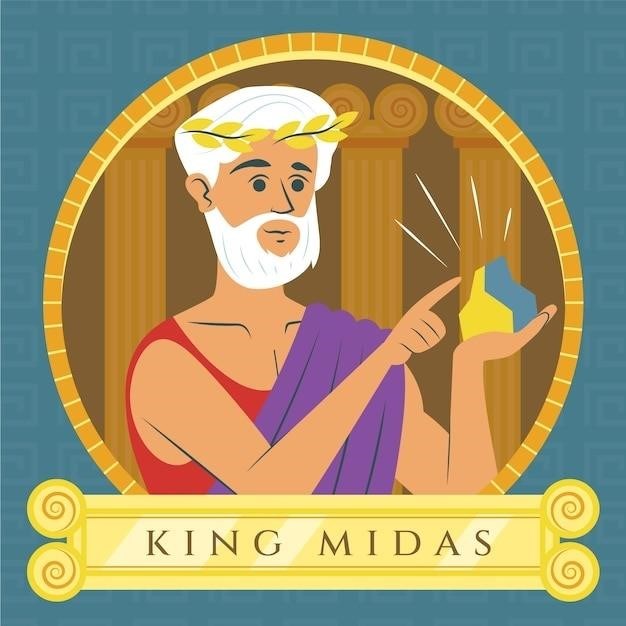Oedipus Rex⁚ Available Text Versions
Numerous online resources offer Sophocles’ Oedipus Rex in PDF format. These include full texts, versions with explanations, and modern translations, often freely downloadable.
Oedipus Rex Full Text PDFs
Oedipus Rex with Explanations
Enhance your understanding of Sophocles’ Oedipus Rex with PDFs that offer integrated explanations. These versions go beyond a simple text transcription, providing valuable insights into the play’s complex themes, characters, and historical context. Annotations might clarify obscure vocabulary, explain allusions to Greek mythology, or offer interpretations of key scenes and dramatic devices. Some PDFs incorporate line-by-line analyses, breaking down the dialogue and action to illuminate the subtleties of Sophocles’ writing. Such resources are invaluable for students and casual readers alike, providing a deeper engagement with the play’s intricate plot and enduring relevance. The inclusion of explanatory material makes these PDFs particularly useful for educational purposes. Look for versions that offer a balance between textual accuracy and insightful commentary, ensuring a rewarding reading experience.
Modern Translations in PDF
Accessing Oedipus Rex in modern English translations via PDF offers unparalleled convenience and accessibility. These versions render Sophocles’ ancient Greek into contemporary language, making the play’s profound themes and intricate plot readily comprehensible to a wider audience. Different translators adopt unique stylistic approaches, impacting the overall feel and interpretation of the text. Some prioritize literal accuracy, preserving the nuances of the original Greek, while others favor a more fluid and accessible style. Exploring multiple translations can reveal fascinating variations in interpretation and highlight the richness and complexity of the original work. The availability of these PDFs allows readers to compare and contrast these interpretations, enhancing their understanding and appreciation of Sophocles’ masterpiece. This accessibility democratizes engagement with a cornerstone of Western literature.
Free Downloadable PDFs
The digital age has revolutionized access to literary classics, and Oedipus Rex is no exception. A wealth of free, downloadable PDFs of the play are readily available online, eliminating the financial barrier to engagement with this seminal work of Greek tragedy. These readily accessible digital versions allow for immediate access to Sophocles’ powerful storytelling, regardless of geographical location or economic constraints. Users can easily download and read the text on various devices, enhancing the accessibility of this influential play. The availability of multiple translations in PDF format also allows readers to compare different interpretations, enriching their understanding and appreciation of the narrative’s complexities. This democratization of access to literature empowers readers worldwide to engage critically with one of history’s most enduring and thought-provoking dramas.
Analyzing Oedipus Rex
Delve into Sophocles’ masterpiece, exploring its intricate plot, profound themes, and compelling characters to uncover its enduring power.
Plot Summary and Key Events
Oedipus Rex opens with Thebes plagued by a mysterious curse. Oedipus, the city’s king, vows to find the culprit and lift the blight. Through investigation, he uncovers a prophecy foretelling that he would kill his father and marry his mother. Initially dismissing it, Oedipus’s inquiries lead him to uncover the horrifying truth⁚ he unknowingly fulfilled the prophecy. He had killed King Laius, his biological father, and married Jocasta, his biological mother. Upon realizing this devastating truth, Jocasta takes her own life, and Oedipus blinds himself, overwhelmed by guilt and despair. His actions highlight the devastating consequences of fate and the limitations of human knowledge in the face of destiny. The play culminates in Oedipus’s exile, leaving Thebes still struggling under the weight of his actions, a powerful testament to the tragic consequences of unchecked ambition and the unavoidable nature of fate.
Themes⁚ Fate, Free Will, and Human Knowledge
Oedipus Rex profoundly explores the interplay between fate, free will, and the limits of human understanding. The prophecy dooming Oedipus highlights the powerful influence of predetermined destiny, suggesting that certain events are inescapable. However, Oedipus’s active pursuit of truth and his relentless efforts to avoid the prophecy also suggest a degree of agency. His actions, though ultimately leading to the fulfillment of the prophecy, demonstrate a struggle against fate. The play further examines the fallibility of human knowledge. Oedipus’s intellectual pride blinds him to the truth, initially leading him to believe he can defy the gods. His relentless investigation, while driven by noble intentions, ironically reveals the tragic truth he desperately tried to avoid. The central conflict between fate and free will, interwoven with the limitations of human understanding, forms the core of the play’s enduring power and its continued relevance to modern audiences.
Character Analysis⁚ Oedipus, Jocasta, Creon
Oedipus, the tragic hero, embodies hubris and a relentless pursuit of truth, ultimately leading to his downfall. His unwavering confidence and intellectual pride ironically blind him to the horrifying reality of his past. Jocasta, his wife and mother, represents a complex figure grappling with the weight of fate and the devastating consequences of her actions. Her initial denial and subsequent despair highlight the devastating impact of the truth. Creon, Oedipus’s brother-in-law, serves as a foil, exhibiting a more cautious and pragmatic approach to governance. He acts as a voice of reason, albeit sometimes conflicted, navigating the political turmoil resulting from Oedipus’s actions and the plague that afflicts Thebes. The contrasting personalities and their responses to the unfolding tragedy reveal the multifaceted nature of human behavior under immense pressure and the various ways individuals confront the weight of destiny.

Historical and Literary Context
Oedipus Rex, written by Sophocles around 429 BC, exemplifies ancient Greek tragedy and its conventions, profoundly influencing subsequent theater.
Sophocles’ Life and Works
Sophocles, a towering figure of ancient Greek literature, flourished in Athens during the 5th century BC. Born into a wealthy Athenian family around 496 BC, his life spanned a period of significant political and cultural transformation in Athens. While precise biographical details remain scarce, his prominence as a playwright is undeniable. He is renowned for his contributions to the development of Athenian tragedy, a dramatic form that explored profound themes of fate, morality, and human suffering. His plays, characterized by intricate plots, compelling characters, and soaring choral odes, often engaged with mythological narratives. Though he penned around 120 plays, only seven have survived the ravages of time, testament to their enduring literary merit. These surviving masterpieces, including the iconic Oedipus Rex, Antigone, and Oedipus at Colonus, continue to captivate audiences and scholars alike, providing invaluable insights into the cultural values and artistic sensibilities of classical Greece. His innovative dramatic techniques and profound explorations of the human condition cemented his status as one of the greatest playwrights of all time.
Ancient Greek Tragedy and its Conventions
Ancient Greek tragedy, a dominant dramatic form of classical Athens, held a unique position within the city’s cultural and religious life. Tragedy, often performed during religious festivals honoring Dionysus, the god of wine and theatre, was more than mere entertainment; it served as a vehicle for exploring profound themes of human existence. Key conventions shaped the structure and style of these plays. A chorus, a group of singers and dancers, provided commentary and insight, often representing the views of the community. The use of a dramatic irony, where the audience possesses knowledge hidden from the characters, heightened the tension and emotional impact. The plays typically featured a protagonist, often a noble figure, whose flaws or fate led to their downfall. This downfall, or catastrophe, often involved suffering and death, prompting reflection on the nature of human agency and the power of fate. Furthermore, the plays employed a highly stylized language, characterized by elevated diction and poetic imagery, creating a distinct aesthetic experience for the audience. These conventions, combined with the exploration of universal themes, contributed to the enduring legacy of ancient Greek tragedy.
Influence of Oedipus Rex on Theatre
Sophocles’ Oedipus Rex holds an unparalleled position in the history of theatre, profoundly impacting dramatic traditions across centuries. Its influence extends beyond ancient Greece, shaping the development of Western drama and impacting playwrights and theatre practitioners to this day. The play’s exploration of complex psychological themes, particularly the exploration of fate versus free will, and the protagonist’s tragic downfall, established archetypes that continue to resonate. The play’s masterful structure, employing dramatic irony and a compelling narrative arc, serves as a model for dramatic construction. The use of a chorus, though less prominent in later forms, established a tradition of communal commentary that found echoes in subsequent theatrical productions. Oedipus Rex’s enduring appeal stems from its timeless themes, and its influence is evidenced in countless adaptations, reinterpretations, and critical analyses, cementing its status as a cornerstone of theatrical literature and a touchstone for understanding the human condition.

Exploring Interpretations
Diverse translations and adaptations of Oedipus Rex offer varied interpretations, sparking ongoing critical analyses and discussions of its enduring relevance.
Different Translations and Adaptations
The enduring popularity of Sophocles’ Oedipus Rex is reflected in the multitude of translations and adaptations available. These range from literal renderings aiming for accuracy in conveying the original Greek to more interpretive translations that prioritize readability and accessibility for modern audiences. Different translators make stylistic choices that impact the play’s tone and rhythm, influencing how readers or viewers experience the tragedy. Adaptations extend beyond simple translation, often reimagining the setting, characters, or even plot elements to resonate with contemporary sensibilities. Some adaptations may modernize the language to enhance its impact on a modern audience while others might maintain a more classical tone. These varied approaches contribute to the richness and complexity of Oedipus Rex‘s legacy, allowing for diverse interpretations and ongoing engagement with the text across centuries and cultures. The availability of these diverse versions in PDF format further enhances access to the play’s multiple facets and interpretations.
Critical Analyses and Interpretations
Oedipus Rex has been a subject of intense scholarly scrutiny for centuries, resulting in a vast body of critical analyses and interpretations. Scholars have examined the play’s exploration of fate versus free will, the nature of human knowledge and its limitations, and the devastating consequences of hubris. Psychoanalytic readings delve into Oedipus’s psychological complexities, viewing his actions through the lens of Freudian concepts like the Oedipus complex. Feminist critics have analyzed the roles and portrayals of female characters like Jocasta, questioning their agency and limitations within the patriarchal society depicted. Post-structuralist approaches deconstruct the play’s narrative structure and language, exploring the instability of meaning and the subjective nature of interpretation. These diverse critical perspectives enrich our understanding of Oedipus Rex, revealing its enduring relevance and capacity to generate insightful debate across various theoretical frameworks. The ongoing critical engagement ensures the play’s continued significance in literary and theatrical studies.
Modern Relevance and Enduring Appeal
Sophocles’ Oedipus Rex maintains remarkable relevance in the modern world despite its ancient origins. The play’s exploration of universal themes—fate, free will, the limitations of human knowledge, and the consequences of unchecked ambition—continues to resonate deeply with audiences. The psychological depth of Oedipus’s character, his struggle against predetermined destiny, and his tragic downfall evoke powerful emotions and provoke thought-provoking discussions about personal responsibility and the human condition. The play’s dramatic structure, with its suspenseful plot twists and compelling characters, remains captivating. Modern adaptations and reinterpretations of Oedipus Rex in various media, from film and theater to literature and opera, demonstrate its enduring appeal and adaptability. Its exploration of timeless moral dilemmas ensures its continued study and discussion in classrooms and scholarly circles worldwide, solidifying its status as a cornerstone of Western literature.



